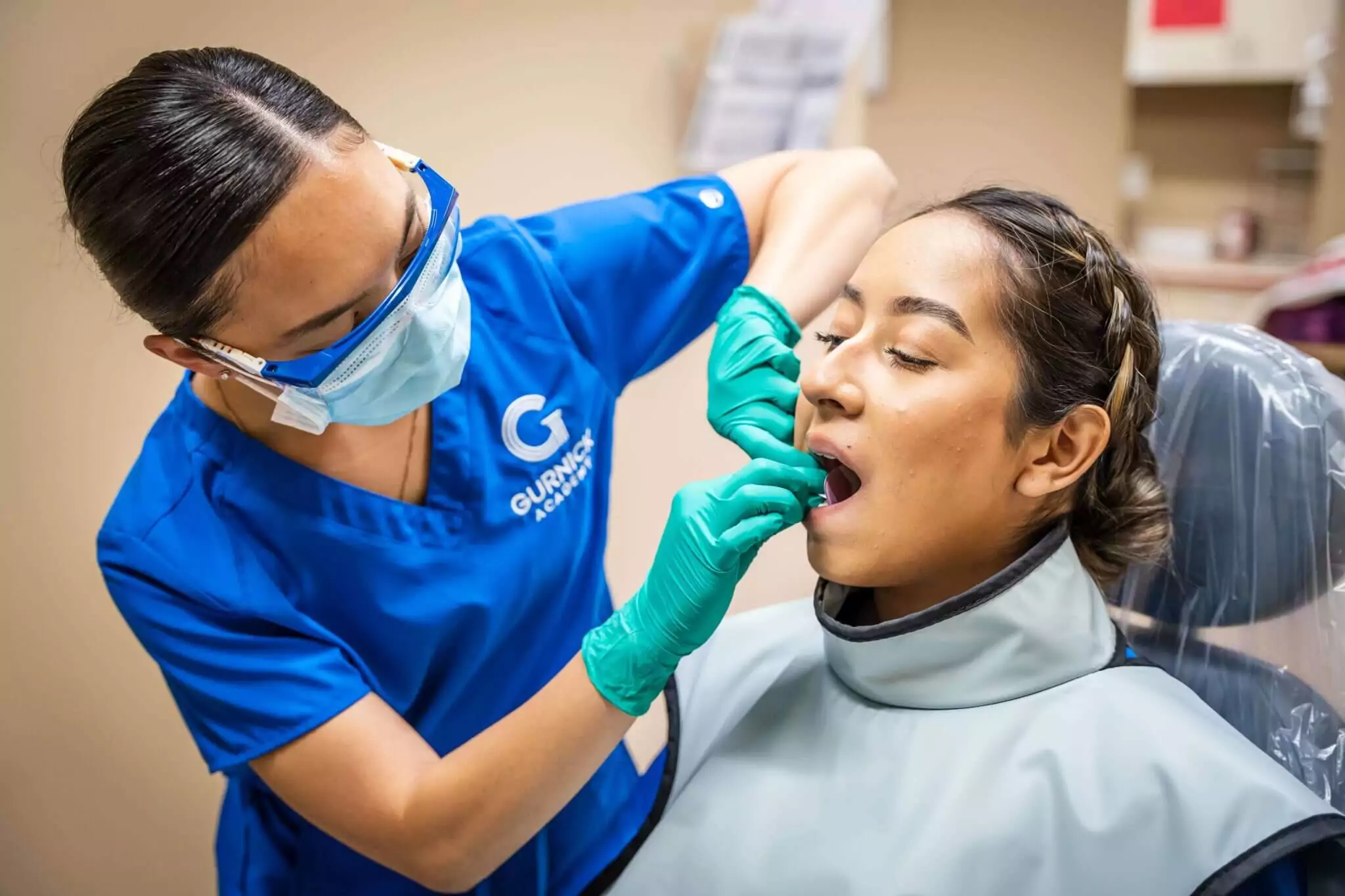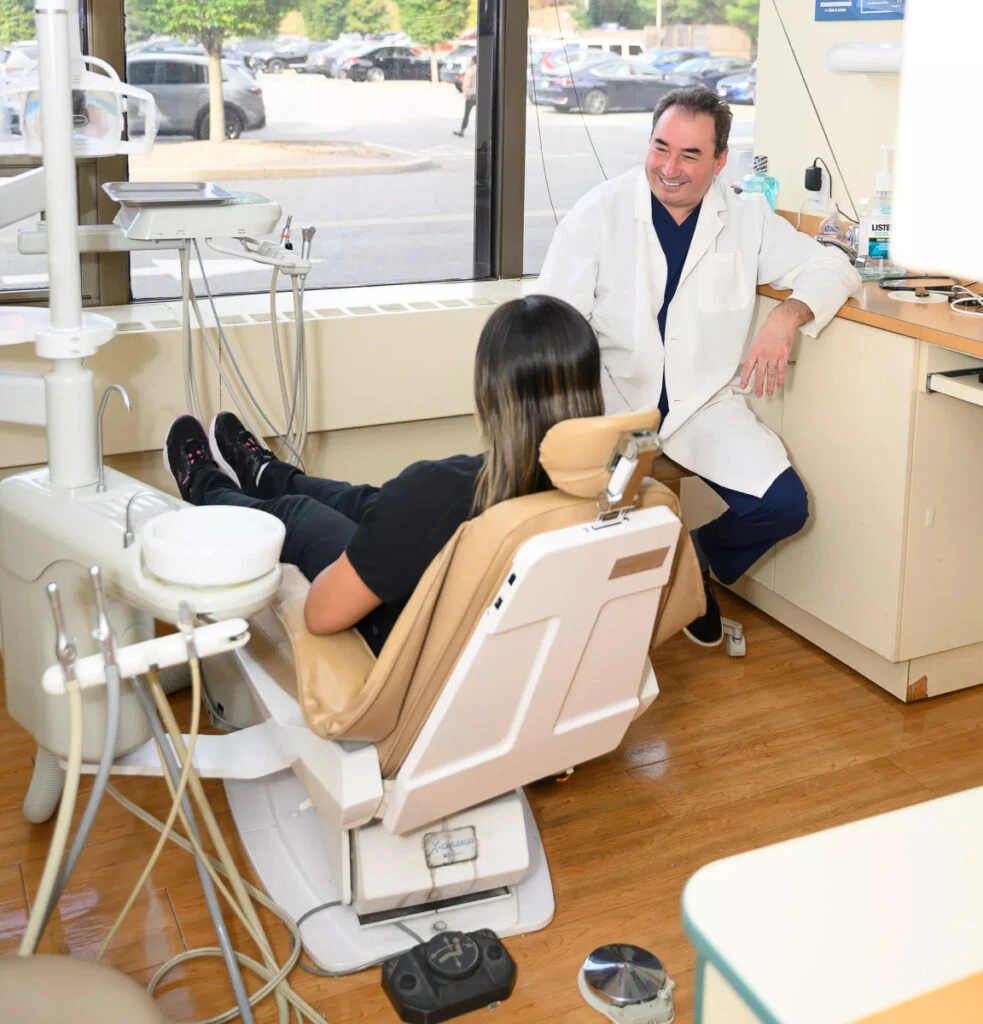Table of contents
Get Started with Kwikly
Get the latest updates, insights, and exclusive content delivered straight to your inbox.
Who This is For:
- Individuals exploring dental careers
- High school or college students considering dental hygiene or dental assisting
- Anyone comparing healthcare roles based on salary and training requirements
Key Takeaways:
- Dental hygienists bring home a lot more than dental assistants - we're talking $77,000 versus $38,215 on average. The reason? Hygienists need way more schooling.
- Where you work makes a huge difference in what you'll earn. Both jobs pay better in certain areas, and if you're working in specialty practices, you'll probably see more money.
- Education is a major factor: dental hygienists must complete an accredited associate or bachelor’s degree and obtain licensure.
- Dental assistants can often enter the field faster with less schooling, but may increase their pay with certifications and experience.
If you're thinking about working in dentistry, chances are you've wondered about the pay difference between dental hygienists and dental assistants. Here's the thing - dental hygienists make way more money. We're talking about a pretty big gap here, and this article will break down why that is and what affects these paychecks.
Introduction to Dental Careers: Dental assistants and Dental Hygienists
If you're thinking about getting into dental work, you've probably heard about dental assistants and dental hygienists. Maybe you like the idea of helping people with their health, or maybe you just want a stable job that pays well. Either way, these are two of the biggest opportunities in dental offices. But here's the thing - they're pretty different when it comes to what you'll actually be doing, how much school you'll need, and what you can expect to make. If you want to pick the right path for yourself, you need to know what you're getting into.
Dental assistants are the people who keep everything running smooth in dental offices. You'll be right there helping the dentist during procedures, handling paperwork, and taking care of patients. The good news? You can work pretty much anywhere - private offices, community clinics, even school programs. Getting started is pretty straightforward too. Most people just need to finish a training program at a community college or vocational school, and then pass the CDA exam in most states. That means you can get your career going relatively fast and start building experience right away.
Now, dental hygienists are a different story. You're looking at more independence and more responsibility. You'll be doing the actual cleanings, fluoride treatments, and checking patients' mouths for problems. But you'll need more schooling - usually an associate's or bachelor's degree in dental hygiene - plus you'll have to pass national and state exams to get licensed. The payoff? Dental hygienists make more money than dental assistants, which makes sense given all the extra training and skills you need.
Both jobs are in high demand right now, and that's not changing anytime soon. Whether you're more interested in the behind-the-scenes stuff, hands-on patient care, or the preventive side of things, there are plenty of opportunities out there. Dental offices, clinics, school programs - they all need qualified people. With the right training, you can really make a difference in people's lives and their health.
Picking between dental assistant and dental hygienist really comes down to what you want and how much school you're willing to do. Both paths give you a solid career in healthcare where you'll be part of a team that's actually helping people every day. If you're ready to figure out which one fits you better, keep reading - we'll break down everything you need to know about salaries, daily tasks, and what your career could look like.

Key Differences in Salary
Here’s what you need to know - dental hygienists just plain earn more than dental assistants. It’s not even close. For example, dental assistants earn around $40,000 per year on average, while dental hygienists typically make significantly more. The main reason? All that extra schooling and training hygienists have to go through.
Both jobs matter in dental offices, don’t get me wrong. But the level of stuff hygienists need to know and do means they get paid more. That’s just how it works.
Average Salary for Dental Hygienists
If you become a dental hygienist, you’re looking at around $77,000 a year on average. That’s pretty good money, and it’s one of the big reasons people go this route. Unlike dental assistants who can sometimes start working right out of high school, hygienists have to put in serious time with education and pass tough exams. To practice as a dental hygienist, you must earn at least an associate's degree from an accredited program. After completing your education, all states require dental hygienists to obtain a license, but the specific requirements and qualifications can vary by state. But here’s the thing - all that work pays off with a much bigger paycheck.
Hygienists work in dental offices under the dentist, but they’re doing stuff that takes real skill and precision. All that education—whether it’s an associate’s or bachelor’s degree—means you’re getting paid well for what you know. As part of their responsibilities, dental hygienists monitor and help prevent tooth decay, gum disease, and other oral diseases during patient care. That’s the main reason hygienists make more than assistants. Plus, you can work in different types of places, and you’re really helping patients in a big way.
Average Salary for Dental Assistants
In 2023, dental assistants earn around $38,215 a year on average. But here’s the thing - this number changes a lot depending on where you work and how long you’ve been doing it. Most dental assistants earn about $41,000 yearly, or roughly $20 an hour. If you want to get working fast without spending years in school, this is a solid option.
To become a dental assistant, you typically need to complete a dental assisting program, which covers topics like dental procedures, patient care, and infection control, and can lead to certifications that help advance your career. In some states, only a high school diploma is needed to start working as a dental assistant.
Now, the top 10 percent of dental assistants? They’re making more than $61,060. And if you’re in a place like New Hampshire, you might see average salaries as high as $72,639. Location really matters here. Also, if you work in specialty practices, you’ll probably make more than if you’re in a regular dental office. Here’s what you should know:
- Top earners make more than $61,060
- Some states like New Hampshire pay way more - up to $72,639 on average
- Where you work changes everything
- Specialty practices usually pay better than general offices
Factors Influencing Salaries
A bunch of things affect what you’ll make as a dental hygienist or assistant. Education, experience, where you live - they all matter. If you understand these factors, you can make smarter choices about your career and what you might earn.
Education and certifications are huge, but experience and getting specialized can really bump up your pay too. And honestly, the state or area where you work can make a massive difference in your salary.
Additionally, the growing demand for oral healthcare services, especially among the aging population, is increasing the need for both dental hygienists and dental assistants.

Education and Certification Requirements
If you want to be a dental hygienist, here's what you're looking at:
- You'll need an associate degree in dental hygiene from a program that's CODA-accredited.
- Sometimes you might want a bachelor's or even master's degree to make more money and get better opportunities.
- You have to pass state licensing exams to work, which makes you more valuable.
Dental assistants? You can start working right after high school in some states - no formal training needed. But if you complete a real dental assistant training program (anywhere from four months to two years), you'll have way better job opportunities and earning potential. Here's the deal:
- Some states let you start with zero formal training.
- Training programs run from four months to two years.
- Finishing these programs opens more doors and better pay.
- You don't always have to become certified, but it helps you move up.
- Certifications in things like radiology and infection control are worth it.
Getting educated as a hygienist costs more and takes longer than becoming an assistant. But that investment usually means much higher pay down the road. For both jobs, finishing accredited programs is key to making more money.
Experience and Specialization
How long you've been working matters a lot for hygienists - more experience usually means more money. If you specialize in areas like orthodontics or periodontics, you can really boost your salary. Bottom line - experience and specialization are huge for how much you can make in both jobs.
New dental assistants make less than people who've been doing it for years. As you gain experience, your earning potential goes up, especially if you get specialized or certified in areas like infection control and radiology. These specializations let you do more complex stuff, which makes you more valuable.
Geographic Location
Where you live and work makes a huge difference in what dental professionals earn. States like California and Texas typically pay dental hygienists more because there's strong demand for dental services. Same goes for dental assistants - they make more in states where demand is high and living costs more.
Your location really impacts how much you can make as either a hygienist or assistant.
Job Responsibilities and Their Impact on Salary
Dental hygienists and assistants do completely different things, and that affects their pay. Dental assistants perform their duties under the dentist's supervision, while dental hygienists can operate more independently for certain procedures. Assistants help dentists with administrative stuff and patient care under supervision. Hygienists work more independently - they clean teeth and examine patients on their own.
The more complex and independent work that hygienists do usually means higher pay compared to assistants. If you’re thinking about a career in dentistry, understanding these differences is key.
Dental Hygienist Responsibilities
Hygienists clean patients' teeth, do oral exams, and teach patients about oral health. This stuff requires advanced skills and technical know-how, making hygienists really important for preventive dental care, along with dental examiners.
Working independently means hygienists can do various procedures without a dentist watching over them. Things like scaling and root planing are complex procedures that need real expertise, which is why hygienists earn more than assistants. Dental hygienists may also take dental impressions for diagnostic or treatment planning purposes, such as creating dental appliances or crowns. Some dental hygienists obtain certification to administer local anesthesia, enhancing their ability to provide more comprehensive patient care. Advanced education in dental hygiene can lead to roles in clinical practice, research, or teaching.
Dental Assistant Responsibilities
Assistants help dentists during procedures, take X-rays, clean dental instruments, and a dental assistant does small procedures under supervision. Dental assistants are responsible for taking and managing dental X-rays as part of patient care. They also perform administrative tasks, such as managing records, billing, inventory, and other office duties, which broadens what they do but might limit how much they can make. Dental assistants are often in charge of scheduling appointments to manage patient flow and ensure smooth operations. They help maintain the organization and cleanliness of the dentist's office. Key skills for dental assistants include paying attention to details, being good with your hands, multitasking, staying organized, and knowing dental tools. Understanding their job duties is essential for doing well.
Dental assisting is usually seen as an entry-level job, often requiring you to complete a dental assistant program that gets you a certificate or diploma. Getting certified in things like Infection Control and Radiology can expand what assistants can do, letting them handle more complex tasks and potentially make more money.
Career Advancement Opportunities
Both hygienists and assistants have chances to grow and advance their careers. Getting more education, certifications, and specializations can open doors to better roles and higher salaries for an assistant or dental hygienist. For dental hygienists, obtaining a bachelor's degree allows them to pursue positions such as instructors or team leaders within dental practices.
Many dental professionals also benefit from continuing education opportunities, which help them stay current and improve their career prospects through the national board and preventive care, ultimately helping with dental health. Programs typically help in this regard, including those focused on dental accreditation.
Advancing as a Dental Hygienist
Hygienists need at least an associate's degree in dental hygiene, but many employers want candidates with a bachelor's degree. Certification and licensing requirements change by state, but all hygienists have to pass a national exam to work professionally. Specializations like periodontics, pediatric dentistry, and orthodontics can really boost a hygienist's career prospects and earning potential.
Continuing education is required for hygienists to keep their licenses, and it often opens doors to better roles and higher pay. Getting a master's degree in dental hygiene can lead to jobs in education, public health, and corporate positions, giving you even more career growth.
Advancing as a Dental Assistant
Assistants have opportunities to advance their careers, which might include expanded duties and additional licenses or certifications. Certifications in areas like:
- Infection Control
- Dental Practice Act
- HIPAA
- Radiology
- Coronal Polishing
- Pit & Fissure Sealants can really boost a dental assistant's career prospects and earning potential.
Professional development help, including workshops and certifications, is commonly offered to certified dental assistant professionals. Many dental assistants also get comprehensive health benefits while pursuing advancement, making this an attractive career path to become a dental assistant.

Benefits Beyond Salary
Besides your paycheck, dental professionals get various employee benefits that make the job more satisfying and improve overall well-being. These benefits often include:
- Health insurance
- Retirement plans
- Paid time off
- Continuing education opportunities.
The combination of different benefits and job support really enhances career satisfaction for dental professionals.
Common Benefits for Dental Hygienists
Important benefits often provided to dental hygienists include:
- Paid time off
- Medical insurance
- Paid vacation
- Sick leave
- Contributions to retirement plans
Also, continuing education opportunities are frequently provided to help dental hygienists stay current and advance their careers.
Dental hygienists might also get employee discounts on dental services for themselves and their families. These benefits don't just make the job more satisfying - they provide financial security too, making dental hygiene a rewarding career choice.
Common Benefits for Dental Assistants
Dental assistants often get paid time off, including vacation days and sick leave. Being part of professional associations like the American Dental Assistants Association lets dental assistants gain professional development and stay updated with best practices.
Besides insurance and paid time off, dental assistants get various professional development opportunities, which can improve their skills and career prospects. These benefits add to overall job satisfaction and career growth in dental assisting.
Job Outlook and Market Demand
The job outlook for both dental hygienists and assistants looks really good, with both professions expected to grow significantly over the next decade. This growth comes from people becoming more aware of oral health importance and dental services expanding.
Understanding market demand and job growth can help you make smart decisions about your career path and future opportunities in the dental field.
Job Growth for Dental Hygienists
The projected job growth for dental hygienists by 2031 includes:
- A growth rate of 9%, which is much faster than average for all jobs
- About 15,300 new positions opening annually
- As of 2021, a workforce size of 214,000 jobs held by dental hygienists
This shows strong demand for dental hygienists in the coming years.
The good job outlook for dental hygienists comes from an aging population needing more dental care and the ongoing focus on preventive dental services. This positive trend suggests a stable and rewarding career path for people entering the dental hygiene profession.
Job Growth for Dental Assistants
Demand for dental assistants is projected to grow nearly twice as fast as the average growth rate for all other jobs. As of 2021, dental assistants held about 358,600 jobs, and this number is expected to keep rising. The increasing demand for dental services, plus the need for efficient dental practice operations, drives job growth for dental assistants.
Experienced dental assistants can make up to $30 per hour, making this a viable long-term career option. Some dental assistants have been working in the field for over a decade, showing the stability and potential for career longevity in this profession.
Choosing the Right Career Path
Choosing between a career as a dental hygienist or dental assistant should depend on your personal goals, interests, and what resources you have available.
Dental assisting typically needs less schooling and lets you get into the workforce faster, making it attractive if you want to start your career quickly. Dental hygiene can be a worthwhile career choice. But it requires committing to a multi-year college program if you have the time and resources.
Both paths offer unique benefits, so you need to align your choice with your career goals and financial situation.
Assessing Personal Interests and Skills
Successful dental hygienists have several key skills. These include effective communication, documentation skills, manual dexterity, and attention to detail. These skills are crucial for doing things like cleaning teeth, conducting oral exams, and educating patients on oral hygiene and oral health. You have to complete a dental program to become a dental hygienist. You also need to pass the national written and clinical exams and get a state license.
On the other hand, dental assistants need strong multitasking abilities, organizational skills, and attention to detail to support dentists during procedures and manage routine tasks and administrative tasks. Looking at your personal interests and skills can help determine which career path is the best fit for you in the dental assistant vs other healthcare roles.
Financial Considerations
Money matters play a big role in choosing between becoming a dental hygienist or dental assistant. After earning a bachelor's degree, dental hygienists can pursue careers as dental hygiene instructors, which can boost their earning potential. While the initial investment in education for dental hygiene is higher, the long-term salary benefits and career advancement opportunities can make it worth it.
On the flip side, dental assisting offers quicker entry into the workforce, which can be financially advantageous if you're looking to start earning sooner.
Summary
Both dental hygienists and assistants play important roles in the dental field, each with different responsibilities, education requirements, and salary potential. Hygienists generally make higher salaries because of their extensive education and specialized skills, while assistants benefit from getting into the workforce quicker. Things like experience, specialization, and where you live significantly influence earning potential for both roles. Ultimately, choosing the right career path depends on your personal interests, financial considerations, and long-term career goals. By understanding the differences and opportunities in each profession, you can make an informed decision that fits with what you want to achieve.
Frequently Asked Questions
What is the main difference between the salaries of dental hygienists and dental assistants?
Dental hygienists typically make higher salaries than dental assistants because they have more education and specialized skills. This difference in training and responsibilities is what sets their earnings apart.
What education is required to become a dental hygienist?
To become a dental hygienist, you'll need an associate degree in dental hygiene from an accredited program and to pass state licensure exams. It's a straightforward path to a rewarding career in healthcare!
Can dental assistants advance their careers?
Absolutely! Dental assistants can boost their careers by getting additional certifications and licenses, which not only increases their earning potential but also opens up more job opportunities.
What are the common benefits for dental hygienists?
Dental hygienists often enjoy perks like paid time off, medical insurance, retirement plans, and opportunities for continuing education. These benefits make the profession not just rewarding, but also supportive of long-term career growth.
How does geographic location affect the salaries of dental professionals?
Your location plays a big role in how much dental professionals earn, often leading to higher salaries in areas with greater demand for dental services and a higher cost of living. If you're considering a career in dentistry, where you work can really make a difference in your paycheck!








